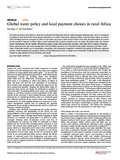Global Water Policy and Local Payment Choices in Rural Africa
Abstract
Sub-Saharan Africa is least likely to meet the Sustainable Development Goal for safely-managed drinking water. Africa is estimated to require at least three times more annual investment, as a share of the gross regional product, than any other region to achieve ‘basic’ drinking water for everyone by 2030. If rural water users are to share some of these costs then the performance of current services needs to improve. In Africa, when a rural waterpoint fails, it takes a month or more to repair. We model water user choices across maintenance service models delivered by public, private and community providers with trade-offs in speed of repairing faults, payment levels and cash management. We find higher payments are associated with higher education and faster repair times. Household wealth, sex of respondent, seasonality, and waterpoint congestion, reliability and quality all influence payment choices. Understanding local payment choices provide behavioural clues to design more sustainable funding and service delivery models to align global and local drinking water goals.


